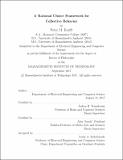A rational choice framework for collective behavior
Author(s)
Krafft, Peter M. (Peter Martin)
DownloadFull printable version (3.272Mb)
Other Contributors
Massachusetts Institute of Technology. Department of Electrical Engineering and Computer Science.
Advisor
Joshua B. Tenenbaum and Alex "Sandy" Pentland.
Terms of use
Metadata
Show full item recordAbstract
As the world becomes increasingly digitally mediated, people can more and more easily form groups, teams, and communities around shared interests and goals. Yet there is a constant struggle across forms of social organization to maintain stability and coherency in the face of disparate individual experiences and agendas. When are collectives able to function and thrive despite these challenges? In this thesis I propose a theoretical framework for reasoning about collective intelligence--the ability of people to accomplish their shared goals together. A simple result from the literature on multiagent systems suggests that strong general collective intelligence in the form of "rational group agency" arises from three conditions: aligned utilities, accurate shared beliefs, and coordinated actions. However, achieving these conditions can be difficult, as evidenced by impossibility results related to each condition from the literature on social choice, belief aggregation, and distributed systems. The theoretical framework I propose serves as a point of inspiration to study how human groups address these difficulties. To this end, I develop computational models of facets of human collective intelligence, and test these models in specific case studies. The models I introduce suggest distributed Bayesian inference as a framework for understanding shared belief formation, and also show that people can overcome other difficult computational challenges associated with achieving rational group agency, including balancing the group "exploration versus exploitation dilemma" for information gathering and inferring levels of "common p-belief" to coordinate actions.
Description
Thesis: Ph. D., Massachusetts Institute of Technology, Department of Electrical Engineering and Computer Science, 2017. This electronic version was submitted by the student author. The certified thesis is available in the Institute Archives and Special Collections. Cataloged from student-submitted PDF version of thesis. Includes bibliographical references (pages 137-146).
Date issued
2017Department
Massachusetts Institute of Technology. Department of Electrical Engineering and Computer SciencePublisher
Massachusetts Institute of Technology
Keywords
Electrical Engineering and Computer Science.